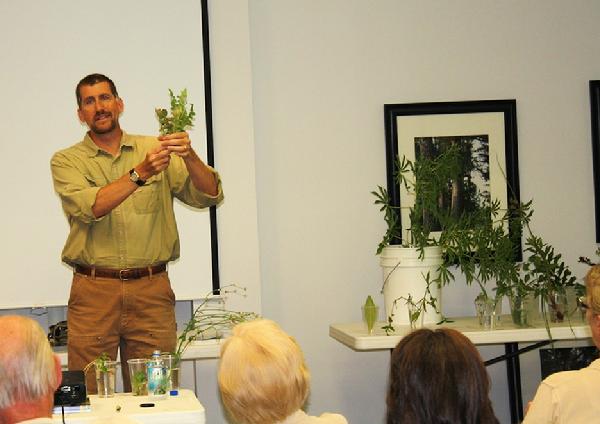 |
| Show and Tell: Dr. Mark Vorderbruggen is an avid naturalist, and is a research chemist. |
|
Acorns, Agarita, Sassafras, Smartweed, Spatterdock, Wisteria, Wood Sorrel, Spanish Dagger and so much more! Things we East Texans consider "weeds" are abundant in East Texas and, according to Dr. Mark Vorderbruggen, are good to eat! According to Vorderbruggen, these weeds have super nutritional value. Vorderbruggen stopped by the Polk County Chamber of Commerce on Saturday, August 4, 2012 and spoke for about two hours on which weeds are safe to eat AND proper foraging techniques.
Vorderbruggen (aka Merriwether) was addressing the Piney Woods Lake Chapter Master Naturalists. Merriweather was actually giving the naturalists a basic introduction and offered guidance on eating the wild plants. Equipped with a surplus of samples that he brought from his own yard at his house in Houston (and some that he picked after he arrived in Livingston), Merriwether gave the audience a run down on each wild plant (including pine needles from our common pine trees right here in Polk County). Merriwether is a forager and thus knows the ethics of foraging. The first thing he went over was the foraging ethics which consists of four simple rules:
1. Respect the law. You must have permission from the property owner to collect plant matter. To forage without permission is considered stealing and you can be arrested. Most state and federal land prohibit gathering plants except in survival situations.
2. Respect the land. Fill your holes, pack out your garbage (and garbage left by others), don't hack/slash/smash/burn your way through nature. Don't harvest a plant if there are just a few around.
3. Respect the plant. Don't strip all the leaves from one plant, just take 1 shoot or 2-3 leaves from many plants. Minimize damage to the plants. Cut leaves off the plant with a sharp knife or shears rather than tearing them off. Harvest inner bark using long, thin vertical strips on one side of the tree, do not cut a ring all around the tree which will kill it. Sterilize your cutting tools with alcohol or bleach to prevent transfer of diseases.
4. Respect yourself. Please positively identify any plant before eating it. Eating the wrong plant can lead to illness or in rare circumstances, even death. Also be aware of any environmental hazards in your foraging location such as snakes, bears, or chemical hazards from old oil fields, roadways, lead paint around old buildings or areas subject to flooding from sewers.
"I often see businesses and places that'll use certain plants for landscaping and decoration, and I see it as food!", Merriwether told the audience. "People in my neighborhood know me as the forager" he said, "...they'll look out their window and see me and say oh there's Mark picking weeds again". Like the Steve Irwin of wild plants, Merriwether is an avid student of nature. He clearly and eagerly loves to not only talk about it, he loves to dive into nature first hand.
Good for Our Brains...
Merriwether pointed out to the audience that outdoor activity is good for our brains. According to Merriwether, too many people are staying inside, watching tv, playing video games, just sitting on the couch and it's hurting them. "Our brains have senses that need to be exercised" he said. "When we go outside, all the sights, sounds, and smells opens up our brains and gives our brains exercise that's needed". "Staying inside looking at a TV screen deprives our brains of this much needed activity".
After his speech, the group took a 30 minute recess and enjoyed some locally picked weeds that were incorporated into food. As an attendee I have to say the Kudzu Quiche was out of this world! For those who don't know, Kudzu is a wild vine that grows like crazy in these parts. It abounds just about anywhere you plant it and can quickly take over, so be careful.
Aside from his career as a research chemist, Merriwether's interests include Edible Wild Plants, Making Stuff, Permaculture, Self Sufficiency, Herbal Medicine, Emergency Preparedness, Primitive Skills, Camping, Hiking, Backpacking, Canoeing, Kayaking, Parenthood. Visit Mark's Website!
About Naturalists: More than eating weeds, Naturalists study and practice more than 21 subjects ranging from Texas ecosystems to weather. To attain the title of Certified Master Naturalist requires over 40 hours of training, volunteer work in Polk and surrounding counties, lots of classroom time and lectures from experts in these topics.
Willie Openshaw, Editor
|